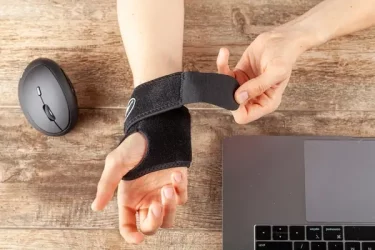Carpal tunnel syndrome (or CTS) can cause discomfort, pain, and a decrease in hand function that can impact your ability to perform daily tasks. For many, carpal tunnel surgery is the recommended treatment to alleviate these symptoms.
In this blog, we explore the factors influencing carpal tunnel surgery waiting times and offer some tips on how to manage the wait.

How long do you have to wait for carpal tunnel surgery?
Waiting times for carpal tunnel surgery can vary significantly across different regions of the UK. The following factors can contribute to these variations:
- Location: Waiting times tend to be shorter in urban areas with more healthcare facilities and surgeons. Rural areas may have longer waiting lists due to limited resources
- Severity of symptoms: Patients with more severe symptoms are often prioritised and may have shorter waiting times. This prioritisation is essential to ensure that those in need of urgent care receive it as soon as possible
- Hospital capacity: The availability of operating rooms and surgical staff can also impact waiting times. Hospitals with high demand for various surgeries may experience longer waiting lists.
NHS waiting times for carpal tunnel surgery
On the NHS, the maximum stated waiting time for non-urgent, consultant-led treatments is 18 weeks. However, this is a guideline and unfortunately, due to high demand, limited resources, and a backlog from the COVID-19 pandemic, it’s likely you will need to wait longer for surgery compared to self-pay options.
You can check NHS waiting times by treatment and location using the My Planned Care tracker.*
(*Practice Plus Group is not responsible for and does not control the content displayed on external websites.)
Private carpal tunnel surgery waiting times
One of the primary advantages of opting for private carpal tunnel surgery is the significantly shorter waiting times. At Practice Plus Group, the average waiting time for private hand and wrist surgery is 4-6 weeks.
You will have an initial consultation where the surgeon will assess your condition, discuss your treatment options, and outline the expected waiting time for your operation. You can then book your surgery with our team at a date and time convenient for you.
The surgery itself takes between 10 and 20 minutes and is done under local anaesthetic. This means you don’t need to stay in hospital overnight and can recover from carpal tunnel surgery at home.
You can learn more about the costs of private carpal tunnel surgery on our dedicated Knowledge hub blog page.
How long is safe to wait for carpal tunnel surgery?
There isn’t a one-size-fits-all answer for this question. The decision should be made in consultation with your healthcare provider. They will take into account the following factors:
- the severity of your symptoms
- the underlying causes of your condition
- your overall health.
For most people with CTS, it’s not always necessary to have surgery immediately. Your treatment will begin with your General Practitioner (GP). If necessary, they will refer you to the musculo-skeletal physiotherapy service. Treatment may start with wrist splints to help keep your wrist in a neutral position or with corticosteroid injections.
Carpal tunnel surgery – at a glance
What to do while waiting for carpal tunnel surgery?
While waiting for surgery, you can take several steps to manage your condition effectively:
- Stay informed: Keep in touch with your healthcare provider to stay informed about your treatment. Make sure you understand what the surgery involves and how to speed up your recovery
- Pain management: Work with your healthcare provider to manage your carpal tunnel symptoms during the waiting period. They may recommend non-surgical treatments such as wrist splints, physiotherapy or pain medications
- Lifestyle adjustments: Make necessary adjustments to your daily activities to reduce strain on your hands. This can include modifying your workspace, using ergonomic tools, and avoiding activities that exacerbate your symptoms
- Stay healthy: Maintain a healthy lifestyle by eating well, staying active, and managing stress. Doing this can help improve your overall well-being and may even alleviate some of the discomfort associated with the condition
- Support groups: Consider joining a support group or seeking guidance from others who have gone through carpal tunnel surgery. They may be able to provide valuable insights and emotional support during your wait
- Private healthcare options: If discomfort becomes unbearable while waiting for surgery and you have the financial means, exploring private healthcare options might be worth considering. Private healthcare can often provide faster access to surgical procedures.
Beat the carpal tunnel surgery waiting lists
Choosing self-pay surgery with Practice Plus Group comes with many benefits:
- shorter waiting times for treatment
- unrivalled Care Quality Commission (CQC) ratings
- flexible treatment dates to work around you.
If you’re struggling with the pain and disruption of carpal tunnel syndrome, why not get in touch? Our friendly contact team will be happy to start you on your journey back to full fitness.







